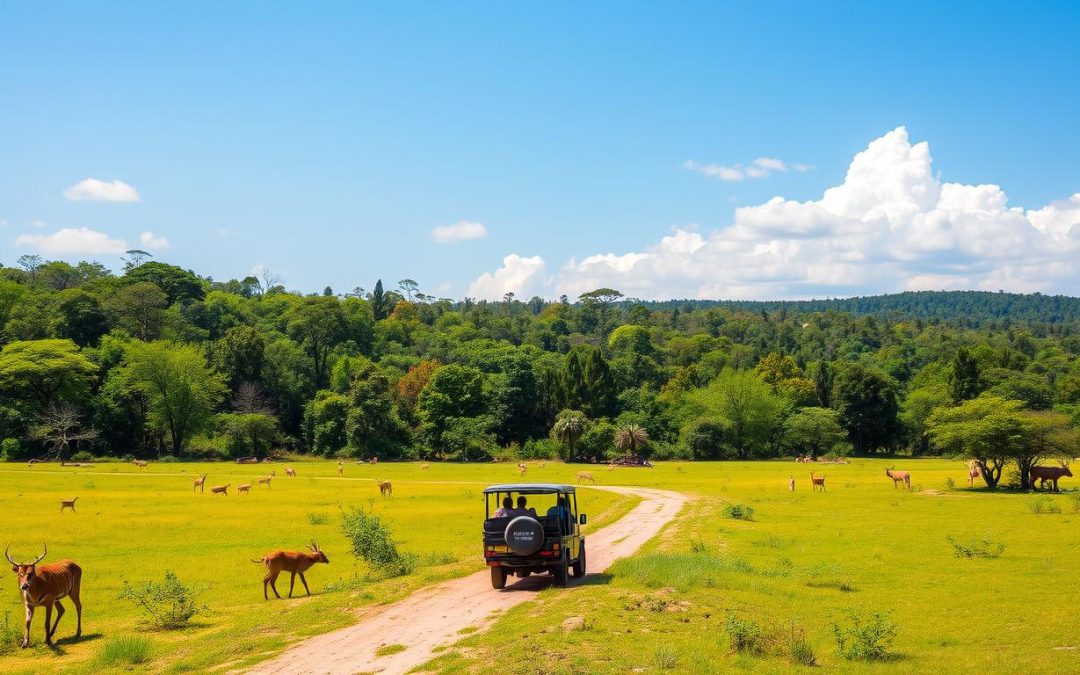Are you ready for the ultimate wildlife adventure in India? Imagine walking into a pristine wilderness where Royal Bengal Tigers roam free. Here, nature shows its most magnificent secrets.
Kanha National Park in Madhya Pradesh is a top wildlife spot. It offers an unmatched experience for nature lovers and adventure seekers. Spanning 362 square miles, it’s a chance to see one of India’s most diverse landscapes.
With many safari zones and wildlife experiences twice a day, Kanha National Park invites you to see India’s natural beauty. Whether you love wildlife photography, conservation, or just want an unforgettable trip, this place has something special for you.
Key Takeaways
- Explore one of India’s largest national parks with high tiger density
- Experience wildlife safaris twice daily in multiple park zones
- Discover 43 different animal species and over 900 plant varieties
- Witness the majestic Royal Bengal Tiger in its natural habitat
- Enjoy diverse safari options including Jeep and Canter experiences
- Learn about critical conservation efforts in a protected ecosystem
Introduction to Kanha National Park’s Natural Heritage
Get ready for an amazing jungle adventure in India’s top tiger reserve. Kanha National Park is a stunning wilderness in Madhya Pradesh. It offers a deep dive into a lively ecosystem that has drawn wildlife lovers for years.
This tiger reserve covers 940 square kilometers. It has a varied landscape with different vegetation types. The park’s location in the Satpura range makes it a perfect spot for wildlife exploration.
Ecosystem Diversity
Kanha National Park has four main vegetation zones. These zones support a wide range of wildlife:
- Moist deciduous forest
- Dry deciduous forest
- Valley meadow
- Dadar meadow
Your adventure will show over 600 species of flowering plants. This creates a rich home for many wildlife species. The park’s climate is key to its biodiversity, with each season offering a unique view of this natural wonder.
“Kanha is not just a tiger reserve, it’s a living, breathing ecosystem that tells a story of survival, beauty, and intricate natural connections.”
Climate and Landscape
The park sees big changes with the seasons. From cool winters to hot summers, these changes make different environments. Visitors can see how nature adapts all year.
If you love wildlife, nature, or just want a unique tiger reserve experience, Kanha National Park is the place. It offers an incredible journey into India’s wilderness.
Wildlife Safari Adventures in Kanha
Get ready for an unforgettable journey through Kanha National Park. It’s a top spot for those who love exploring nature. You’ll see India’s amazing wildlife in a stunning setting.
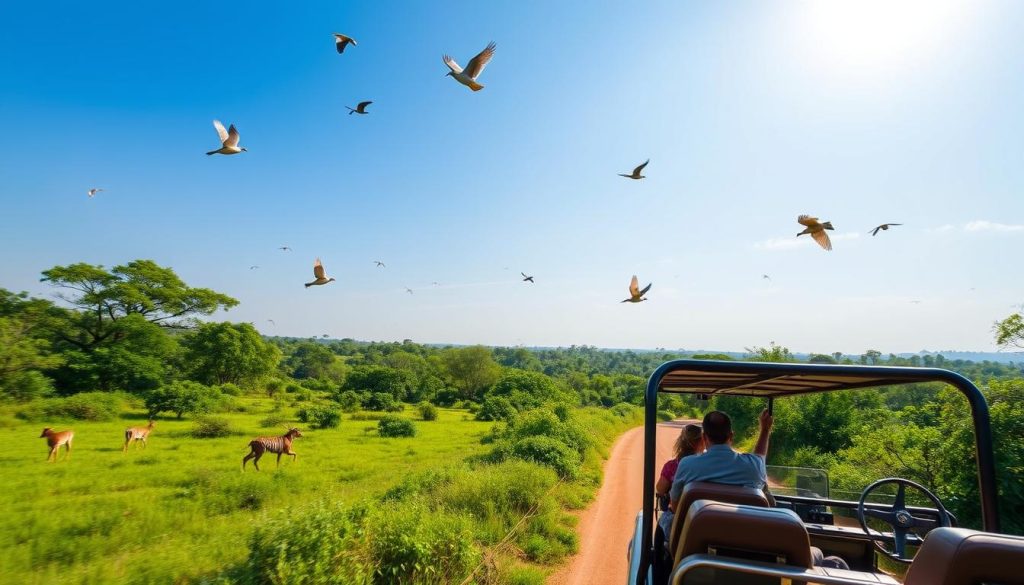
Kanha has two safari trips a day. They let you dive deep into the park’s amazing world:
- Morning Safari: 6:00 AM – 11:00 AM (5 hours)
- Afternoon Safari: 3:00 PM – 6:00 PM (3 hours)
These safaris cover four different areas. Each one offers special chances to see wildlife:
| Safari Zone | Key Wildlife Features |
|---|---|
| Kanha Zone | High tiger density, open meadows |
| Mukki Zone | Rich birdlife, diverse terrain |
| Kisli Zone | Dense forests, varied mammal species |
| Sarhi Zone | Unique landscape, rare wildlife encounters |
“In Kanha, every safari is a potential encounter with the wild’s most beautiful secrets.” – Wildlife Expert
Expert guides and naturalists will be with you. They make sure you have a safe and fun time. You might see Bengal tigers, leopards, wild dogs, and many deer species on your trip.
Don’t forget to book your safari early, especially from October to June. The park is closed during the rainy season. So, plan ahead for your wildlife adventure.
Tiger Spotting and Conservation Efforts
Kanha National Park is a key place for wildlife conservation, especially for tigers. Your safari here lets you see these amazing animals in the wild.
Best Times for Tiger Sighting
The best times to see tigers in Kanha are:
- Summer months (April to June)
- Dry winter periods (November to February)
At these times, tigers often go to water, making your safari even more special.
Tiger Population and Tracking Methods
Kanha uses advanced ways to track its tigers. Park rangers use:
- Camera trap technology
- Pugmark identification
- Genetic sampling
- Regular census surveys
“Conservation is not just about protecting animals, but preserving entire ecosystems.” – Wildlife Expert
Conservation Success Stories
Kanha’s efforts to save tigers have paid off. Thanks to Project Tiger, the park’s tiger numbers have grown. It’s now a vital home for these endangered animals.
By going on a safari in Kanha, you help keep these amazing creatures safe for the future.
Kanha National Park, Madhya Pradesh: Best Things to Do – Top Picks
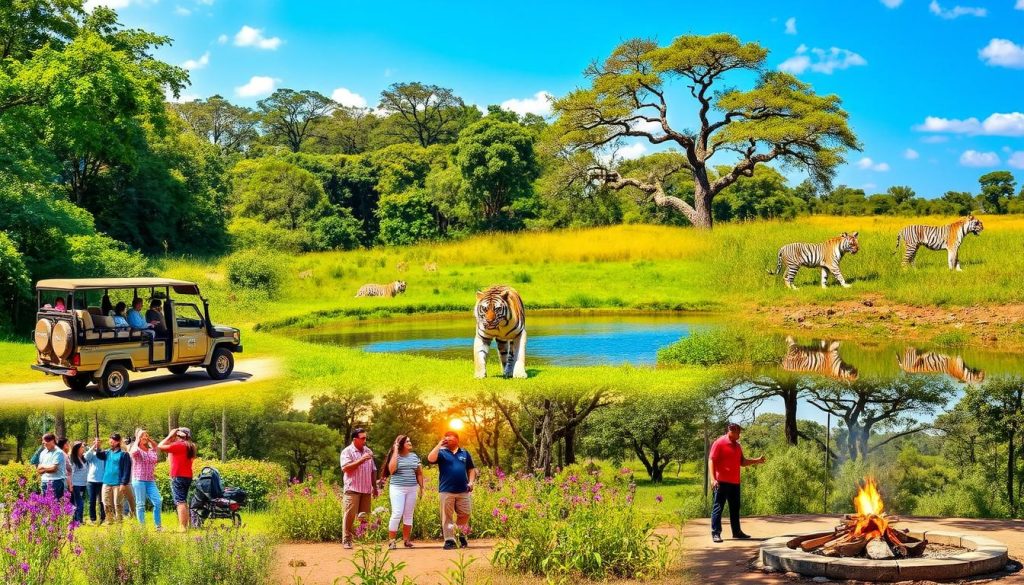
Explore the ultimate eco-friendly travel spot in Kanha National Park. This untouched wilderness offers many exciting activities. They make your wildlife adventure unforgettable.
“Nature is not a place to visit. It is home.” – Gary Snyder
Your trip to Kanha National Park is packed with thrilling experiences. Wildlife lovers can pick from various activities. These show off the park’s amazing biodiversity.
- Jeep Safaris: Explore the park’s diverse terrain
- Elephant Safaris: Experience wildlife from a unique perspective
- Bird Watching: Discover over 300 bird species
- Nature Walks: Immerse yourself in the park’s ecosystem
- Photography Expeditions: Capture wildlife in its natural habitat
The park has well-managed safaris that focus on wildlife conservation. Jeep safaris run twice a day. This helps reduce disturbance to wildlife, giving you the best views.
| Activity | Duration | Cost (INR) |
|---|---|---|
| Morning Safari | 3-4 hours | 9,500 per jeep |
| Afternoon Safari | 3-4 hours | 9,500 per jeep |
| Full-Day Safari | Sunrise to Sunset | 85,000 per jeep |
Kanha National Park in Madhya Pradesh is a top spot for eco-friendly travel. The park’s dedication to conservation makes your wildlife visit good for local ecosystems and communities.
Pro Tip: Book your safari early and pick early morning or late afternoon for the best wildlife views.
Flora and Fauna Diversity
Kanha National Park is a vibrant ecosystem full of wildlife and lush plants. Your journey will show you a landscape where nature is at its best.
Native Plant Species
The park’s landscape is covered in dense sal forests and mixed deciduous woodlands. These forests are home to many wildlife species. Key plants include:
- Sal trees
- Bamboo clusters
- Medicinal plants
- Grassland vegetation
Rare Wildlife Species
Kanha is home to many endangered species. Birdwatching and wildlife observation will show you amazing creatures like:
- Bengal tigers
- Central Barasingha (swamp deer)
- Indian bison (gaur)
- Leopards
- Sambar deer
Birdwatching Opportunities
With over 350 bird species, Kanha is a birdwatcher’s dream. The winter season is the best time to see many birds, including:
- Storks
- Egrets
- Peacocks
- Kingfishers
“Kanha National Park is not just a wildlife sanctuary, but a living, breathing testament to India’s rich biodiversity.” – Wildlife Conservation Expert
Your journey will be filled with the park’s unique ecosystem. It offers a chance to see nature’s intricate web of life.
Safari Zones and Their Unique Features
Kanha National Park offers an extraordinary wildlife safari experience across multiple zones. Each zone has its own character and wildlife opportunities. Your journey through these zones promises an immersive exploration of one of India’s most renowned national park tourism destinations.
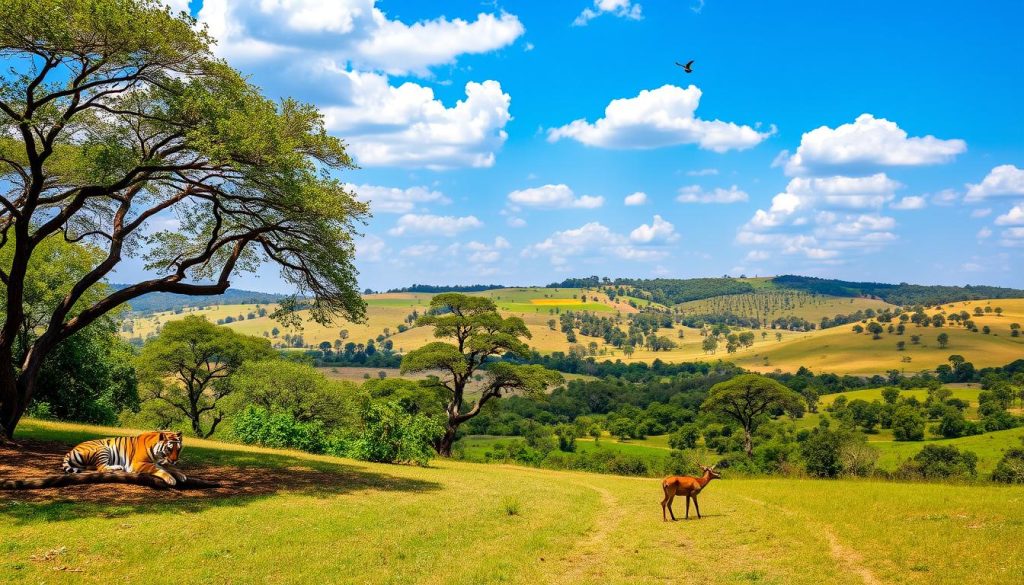
The park features four core zones that create a spectacular wildlife safari landscape:
- Kanha Zone: Known for extensive meadows and prime tiger territories
- Kisli Zone: Rich in biodiversity with diverse wildlife populations
- Mukki Zone: Recognized for higher tiger sighting probabilities
- Sarhi Zone: Famous for first Barasingha (swamp deer) conservation efforts
Visitors can access these zones through three primary entry gates: Katia/Kisli, Mukki, and Sarhi. Each gate provides a unique entry point into the wilderness. They offer different perspectives of Kanha’s rich ecosystem.
| Safari Zone | Wildlife Highlights | Best Viewing Time |
|---|---|---|
| Kanha Zone | Royal Bengal Tigers, Barasingha | Early Morning/Late Afternoon |
| Kisli Zone | Leopards, Wolves, Diverse Birds | Winter Months |
| Mukki Zone | High Tiger Density | November-March |
| Sarhi Zone | Swamp Deer, Rare Wildlife | Early Winter |
“Each safari zone in Kanha offers a unique window into the heart of India’s wilderness.” – Wildlife Conservation Expert
To maximize your wildlife safari experience, plan for 3-4 safaris during a 3-night stay. Remember that daily permits are limited. So, advance booking is crucial for securing your preferred zone and time slot.
Luxury Accommodations and Eco-Lodges
Your jungle adventure needs a perfect place to rest. Kanha National Park has many options that are both luxurious and eco-friendly. These places are great for wildlife lovers who want comfort and care for the environment.
Premium Wildlife Resorts
Find top wildlife resorts that let you dive deep into nature. Some of the best include:
- Kanha Earth Lodge: Situated in 44 acres of reclaimed jungle
- Banjaar Tola: With 18 luxurious suites in two camps
- Chitvan Jungle Lodge: It has 15 rooms and suites for comfort
Eco-friendly Stay Options
Kanha has amazing eco-lodges for those who love sustainable travel. These places are good for the environment and still offer great comfort.
| Lodge | Rooms | Distance from Airport | Sustainable Features |
|---|---|---|---|
| Kipling Camp | 30 total rooms | 156 km | Strong eco-friendly practices |
| Reni Pani Jungle Lodge | 14 rooms | 170 km | Sustainable design and operations |
| Forsyth Lodge | 12 cottages | 180 km | Habitat restoration initiatives |
Camping Experiences
For a real jungle adventure, try these camping spots:
- Shergarh Tented Camp: 6 luxury tents from October to May
- Royal Tiger Resort: 16 suites on 6 acres
- Infinity Resort: 10 tents and 10 villas on 24 acres
“Embrace the wilderness without compromising on comfort or sustainability.” – Eco Travel Experts
Every place to stay in Kanha offers a special way to see the stunning landscape. It also supports eco-friendly travel. Your trip starts with choosing the right place to stay.
Best Time to Visit and Seasonal Guide
Planning your visit to Kanha National Park in Madhya Pradesh is key. The park changes with the seasons, offering unique wildlife views. Each season brings its own special moments.
The park is open from October 16 to June’s end. This time is perfect for wildlife lovers. Your visit timing greatly affects your safari adventure.
Seasonal Breakdown
- Winter (October to March): Comfortable weather, 10°C to 25°C
- Summer (March to June): Best for tiger sightings, up to 40°C
- Monsoon (July to mid-October): Closed due to heavy rain
Safari Timings and Recommendations
| Season | Morning Safari | Evening Safari | Tiger Visibility |
|---|---|---|---|
| Winter | 6:15 AM – 11:30 AM | 3:00 PM – 5:45 PM | Moderate |
| Summer | 5:30 AM – 11:30 AM | 4:00 PM – 7:00 PM | High |
“The magic of Kanha National Park unfolds differently with each season, offering wildlife enthusiasts a dynamic and memorable experience.” – Wildlife Expert
Summer is the best time for tiger sightings near water. Winter is busier but has better weather for exploring.
Booking Tips
- Book safari permits early
- Plan for 3-6 safaris in 3 nights
- Keep an eye on busy times like Diwali and New Year
Kanha National Park offers a unique wildlife adventure in Madhya Pradesh’s changing seasons.
Photography and Nature Trails
Kanha National Park is a dream spot for those who love photography and exploring nature. Its varied landscapes offer amazing chances to capture beautiful wildlife moments all year round.
Photographers, both pros and hobbyists, come to Kanha from November to May. This time is perfect for taking photos of nature and wildlife. The skies are clear, and animals are easy to see.
“Every click in Kanha tells a story of untamed wilderness and raw natural beauty.”
Photography Tips for Wildlife Enthusiasts
- Bring a zoom lens (100-400mm) for detailed wildlife shots
- Choose early morning or late evening safari times for best lighting
- Pack extra camera batteries and memory cards
- Use camouflage clothing to blend with the environment
The park has three main safari areas – Mukki, Kisli, and Kanha. Each offers different views for photography. Mukki is especially great for seeing tigers and has many different habitats.
Recommended Photography Equipment
| Equipment | Recommended Type |
|---|---|
| Camera | DSLR or Mirrorless with high ISO performance |
| Lens | Telephoto zoom (100-400mm) |
| Tripod | Lightweight, portable wildlife tripod |
Pro Tip: Visit in winter (November-March) for the best forest colors and wildlife activity.
Kanha National Park is home to over 300 bird species and 43 animal species. It offers a unique and memorable photography adventure.
Cultural Experiences and Village Tours
Kanha National Park is more than just wildlife. It offers deep cultural experiences that connect you with the area’s heritage. Here, national park tourism means more than just seeing animals. It lets you meet the local communities.
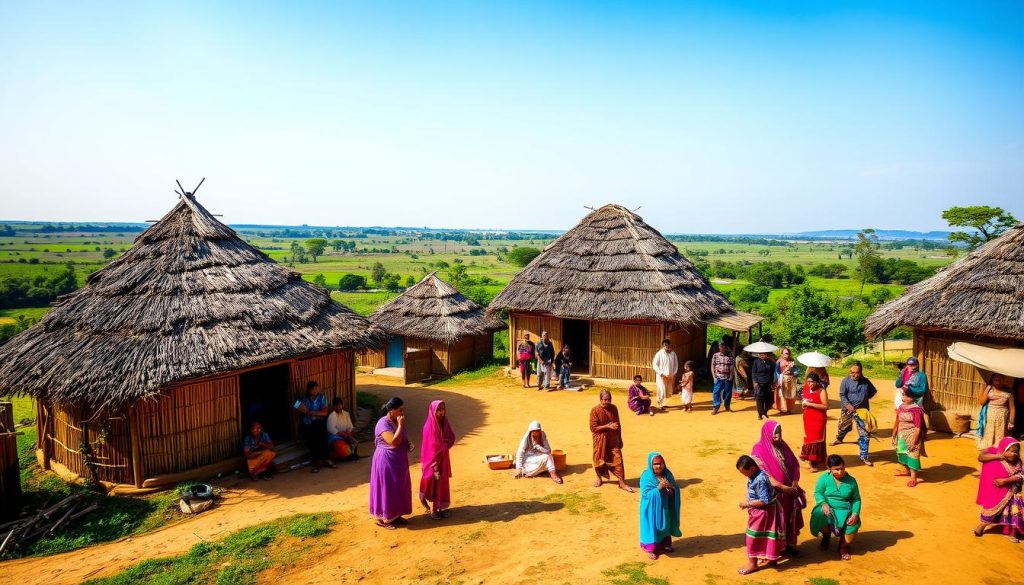
The park’s buffer zone has over 100 villages. These are mostly home to the Baiga and Gond tribes. They live in the forest, showing us how to live sustainably.
Local Tribal Communities
Visiting the villages around Kanha lets you see unique cultures. You can:
- talk to tribal elders
- see how they manage the forest
- learn about their knowledge systems
- see how they live their daily lives
Traditional Art and Craft
The area is known for its amazing art. You can watch and even try your hand at:
- making bamboo crafts
- painting traditional clothes
- making pottery
- making tribal jewelry
Cultural Programs
Evening programs are fun and educational. You’ll see traditional dances, music, and stories. They show the rich culture of the area.
“Every village visit is a journey into the heart of India’s living cultural heritage.” – Local Tourism Guide
Visiting these villages changes your experience. It creates lasting memories that go beyond seeing animals.
Transportation and Accessibility
Planning your trip to Kanha National Park in Madhya Pradesh is key. You need to know the best ways to get there. This will start your amazing wildlife adventure.
The park has many entry points. You can get there by different ways. Here are the main routes to Kanha National Park:
- Nearest Airports:
- Jabalpur Airport (closest to Khatia Gate)
- Raipur Airport (nearest to Mukki Gate)
- Driving Distances:
- Jabalpur to Khatia Gate: 160 kilometers
- Mukki Zone from Jabalpur: 200 kilometers via Mandla-Mocha-Baihar
- Sarhi Gate: 150 kilometers from Jabalpur
You have many ways to get to Kanha National Park:
| Transportation Mode | Estimated Travel Time | Recommended For |
|---|---|---|
| Private Car/Taxi | 4-5 hours from airports | Flexible travelers |
| Government Bus | 6-7 hours | Budget travelers |
| Hired Jeep | Direct route | Convenience seekers |
“The journey to Kanha is as memorable as the wildlife experience itself.” – Wildlife Enthusiast
Here are some tips for your trip to Kanha National Park in Madhya Pradesh:
- Book your transport early in peak season
- Check if the park is open (closes from June 16 to September 30)
- Think about guided tours for easier planning
Plan well and enjoy the incredible journey to one of India’s most spectacular wildlife spots!
Conclusion
Your trip to Kanha National Park is an amazing chance to see wildlife up close. It’s not just about safaris; it’s about diving into India’s natural beauty. You’ll see Royal Bengal Tigers and explore different habitats, making memories that last forever.
When planning your visit, think about the safari packages that fit your style. Whether you pick the Luxury Retreat Package or the Economical Safari Package, Kanha has something for everyone. With four core zones and various safari choices, you’ll get a full wildlife experience.
Visiting Kanha helps protect endangered animals like the Hard Ground Swamp Deer. It also supports keeping India’s tiger population safe. Your trip becomes a way to help the environment and support conservation.
Getting ready for your journey, remember Kanha is more than wildlife. It’s a chance to connect with nature and learn about ecosystems. Your adventure in the tiger reserve is waiting—start your journey!
The above is subject to change.
Check back often to TRAVEL.COM for the latest travel tips and deals.
